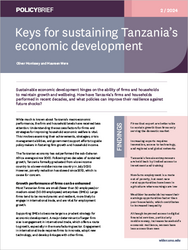Policy Brief
Keys for sustaining Tanzania’s economic development
Sustainable economic development hinges on the ability of firms and households to maintain growth and wellbeing. How have Tanzania’s firms and households performed in recent decades, and what policies can improve their resilience against future shocks?
Firms that export are better able to sustain growth than firms only serving the domestic market
Increasing exports requires innovation, access to technology, and regional and global networks
Tanzania’s female entrepreneurs are held back by limited access to investment and training
Non-farm employment is a route out of poverty, but most new rural opportunities have been in agriculture where earnings are low
Wealthier households increase their earnings opportunities faster than poor households, which contributes to increased inequality
Although improved access to digital financial services, particularly mobile money, increases household's economic resilience, women have less access than men
While much is known about Tanzania’s macroeconomic performance, the firm and household levels have received less attention. Understanding the success factors for firms and strategies for improving household economic welfare is vital. This involves examining their achievements, strategies, crisis management abilities, and government support efforts to guide policymakers in fostering firm growth and household income.
The Tanzanian economy has outperformed the sub-Saharan Africa average since 2000. Following two decades of sustained growth, Tanzania formally graduated from a low-income country to a lower-middle-income country in July 2020. However, poverty reduction has slowed since 2012, which is cause for concern.
Growth performance of firms can be enhanced
Most Tanzanian firms are small (fewer than 50 employees) or medium-sized (50–99 employees) enterprises (SMEs). Large firms tend to be more dynamic and resilient, more likely to engage in international trade, and are vital for employment growth.
Supporting SMEs to become large is a prudent strategy for economic development. A major determinant of larger firm size is engagement in international trade, which offers a route to growth, especially in the manufacturing sector. Engagement in international trade requires firms to innovate, adopt new technology, and develop linkages with other firms.
SMEs in Tanzania rarely operate in regional or global value chains (GVCs). While this provides some protection from global shocks, it limits opportunities for learning and growth. Policy actions that encourage large trading firms to partner with smaller local ones, for instance through fiscal incentives, can support SMEs’ entry to regional or global value chains.
 GVCs make important contributions to employment generation, export growth, and diversification. Regional and national value chains support higher-value activities, such as design and branding, and can therefore serve as ‘stepping stones’ to global markets. Trade and industrial policy tools—such as public procurement contracts and tax breaks—can also support local firms’ entry to value chains. Active trade policies and deeper regional integration can improve competitiveness through reduced tariffs and other barriers to export.
GVCs make important contributions to employment generation, export growth, and diversification. Regional and national value chains support higher-value activities, such as design and branding, and can therefore serve as ‘stepping stones’ to global markets. Trade and industrial policy tools—such as public procurement contracts and tax breaks—can also support local firms’ entry to value chains. Active trade policies and deeper regional integration can improve competitiveness through reduced tariffs and other barriers to export.
Other constraints for firms in Tanzania are low levels of technology-intensive and skilled labour-intensive manufacturing. Service-oriented firms are small and local without structures to learn from more successful firms. A low quality of transport and utilities infrastructure also increases costs and discourages investment.
To increase their economic resilience and recovery from demand shocks, firms have expressed the need for greater government support in capacity development programmes, access to finance, and matchmaking with global buyers. Especially female entrepreneurs face additional constraints in access to finance and training to reduce skill gaps. Women who do manage to invest are as innovative and productive as their male counterparts.
Households are better off, but more support is needed
Diversifying income sources is an important livelihood strategy for households in lower-income countries. Having several livelihoods helps to increase total income and spread risks. Diversification into non-agricultural wage and self-employment is associated with higher welfare, while farming and agricultural wage employment is associated with lower welfare.
 Over the last two decades, low-income households in Tanzania were able to diversify their income sources and contribute to growth in off-farm self-employment. Gender gaps in wage employment participation also declined, but most of the increase in women’s employment is in agriculture where earnings are low. Increasing productivity in agriculture can benefit rural incomes and will especially benefit women.
Over the last two decades, low-income households in Tanzania were able to diversify their income sources and contribute to growth in off-farm self-employment. Gender gaps in wage employment participation also declined, but most of the increase in women’s employment is in agriculture where earnings are low. Increasing productivity in agriculture can benefit rural incomes and will especially benefit women.
Better-off households retain a greater capacity for diversification due to better access to credit, services, and migration. This initial advantage is one reason why it is difficult to reduce inequality. Financial inclusion, especially for women, increases household welfare and reduces inequality. In addition, improved education, access to public transportation, electricity, post and telecommunications, and health facilities helps enhance livelihood diversification for rural households.
Prospects for Tanzania
Government support is vital for ensuring the achievement of sustainable economic development in Tanzania. Firms and households need growth and wellbeing to be resilient in the face of external shocks. Households with more diversified sources of income and access to capital are better able to cope with them. Firms with linkages in value chains and domestic networks are better able to provide employment. Also companies’ investments in technology and innovation benefit households and the whole economy through improved employment opportunities.
Entrepreneurs, especially women, need support in securing funding for investments in technology and training to increase skills
There is a need to encourage large firms into partnerships with smaller ones to share experience and advice
Stronger efforts to improve agricultural productivity, investments in infrastructure and easier access to financial institutions are essential to sustain the welfare of rural households
Active trade policies, innovation promotion through research and development in various sectors, and national value chain upgrading, possibly through public procurement, are necessary for improved firm performance
The economic reforms from the late 1980s that helped establish the conditions for poverty reduction demonstrate the major role that government action can play to sustain economic development in Tanzania. Public policy should focus on human capital formation, including skills training and job matching, incentives for technology transfer and innovation, and a proactive trade and investment policy.
 Join the network
Join the network